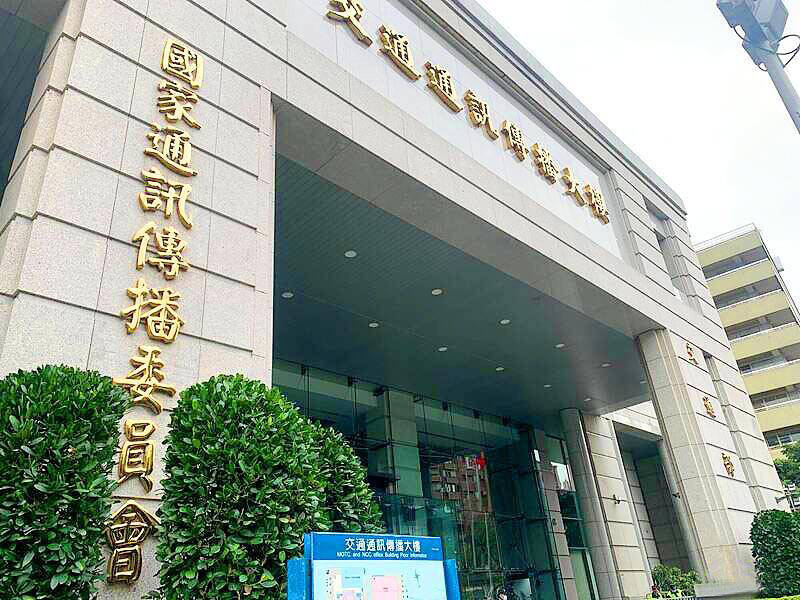Taiwan Mobile has been fined NT$300,000 (US$9,136) as a default surcharge for failing to dispose of the excess bandwidth in frequency bands below 1 gigahertz (GHz) before the deadline designated by the National Communications Commission (NCC), as well as an additional NT$3 million fine for contravening the Telecommunications Act.
Taiwan Mobile has since returned the frequency as ordered.
The commission first issued the ruling on the default charge on July 10 after listening to a statement by Taiwan Mobile chief technology officer C.H. Jih (揭朝華).

Photo: Ting Yi, Taipei Times
The nation’s second-largest telecom was told to rectify the situation within three days after it received the official ruling, or it would face a fine of NT$3 million for failing to follow its business plan.
As the telecom did not rectify the situation as ordered, it was fined NT$3 million by the commission on July 17.
The nation’s three large telecoms are permitted to have no more than 50 megahertz (MHz) in frequency bands below 1GHz, which can produce radio waves that have higher penetration and diffraction capabilities, and enable telecoms to broaden the service coverage of 5G systems.
Taiwan Mobile obtained 60MHz in highly sought-after frequency bands following its merger with Taiwan Star Telecom, which the commission approved last year on the condition that by June 30, Taiwan Mobile must return the excess bandwidth of 10MHz to the government, or sell or transfer it to other telecoms.
In his statement, Jih said the company is still using the excess bandwidth to serve customers, but that it is scheduled to consolidate the base stations of Taiwan Mobile and Taiwan Star by the end of November and return the excess bandwidth to the Ministry of Digital Affairs by the end of December.
Taiwan Mobile said in a separate statement that it has been working ahead of its schedule since Dec. 1 last year.
“However, the time that we had to consolidate the network was too short, and the court has yet to rule over the administrative lawsuit that we filed challenging the conditions of the merger,” the company said. “To ensure the quality of services offered to users and protect shareholders’ interests, we have found it difficult to return the excess bandwidth before the end of June.”
NCC commissioners disagreed with Taiwan Mobile’s explanation, saying it has other ways to protect its users.
“There are multiple ways for the company to consolidate the networks. Why does it have to choose the one that is difficult to complete within a short period of time?” NCC Chief Secretary Huang Wen-che (黃文哲) said on behalf of the commissioners.

Three Taiwanese airlines have prohibited passengers from packing Bluetooth earbuds and their charger cases in checked luggage. EVA Air and Uni Air said that Bluetooth earbuds and charger cases are categorized as portable electronic devices, which should be switched off if they are placed in checked luggage based on international aviation safety regulations. They must not be in standby or sleep mode. However, as charging would continue when earbuds are placed in the charger cases, which would contravene international aviation regulations, their cases must be carried as hand luggage, they said. Tigerair Taiwan said that earbud charger cases are equipped

Foreign travelers entering Taiwan on a short layover via Taiwan Taoyuan International Airport are receiving NT$600 gift vouchers from yesterday, the Tourism Administration said, adding that it hopes the incentive would boost tourism consumption at the airport. The program, which allows travelers holding non-Taiwan passports who enter the country during a layover of up to 24 hours to claim a voucher, aims to promote attractions at the airport, the agency said in a statement on Friday. To participate, travelers must sign up on the campaign Web site, the agency said. They can then present their passport and boarding pass for their connecting international

Temperatures in northern Taiwan are forecast to reach as high as 30°C today, as an ongoing northeasterly seasonal wind system weakens, the Central Weather Administration (CWA) said. CWA forecaster Tseng Chao-cheng (曾昭誠) said yesterday that with the seasonal wind system weakening, warmer easterly winds would boost the temperature today. Daytime temperatures in northern Taiwan and Yilan County are expected to range from 28°C to 30°C today, up about 3°C from yesterday, Tseng said. According to the CWA, temperature highs in central and southern Taiwan could stay stable. However, the weather is expected to turn cooler starting tonight as the northeasterly wind system strengthens again

Taiwan sweltered through its hottest October on record, the Central Weather Administration (CWA) said yesterday, the latest in a string of global temperature records. The main island endured its highest average temperature since 1950, CWA forecaster Liu Pei-teng said. Temperatures the world over have soared in recent years as human-induced climate change contributes to ever more erratic weather patterns. Taiwan’s average temperature was 27.381°C as of Thursday, Liu said. Liu said the average could slip 0.1°C by the end of yesterday, but it would still be higher than the previous record of 27.009°C in 2016. "The temperature only started lowering around Oct. 18 or 19